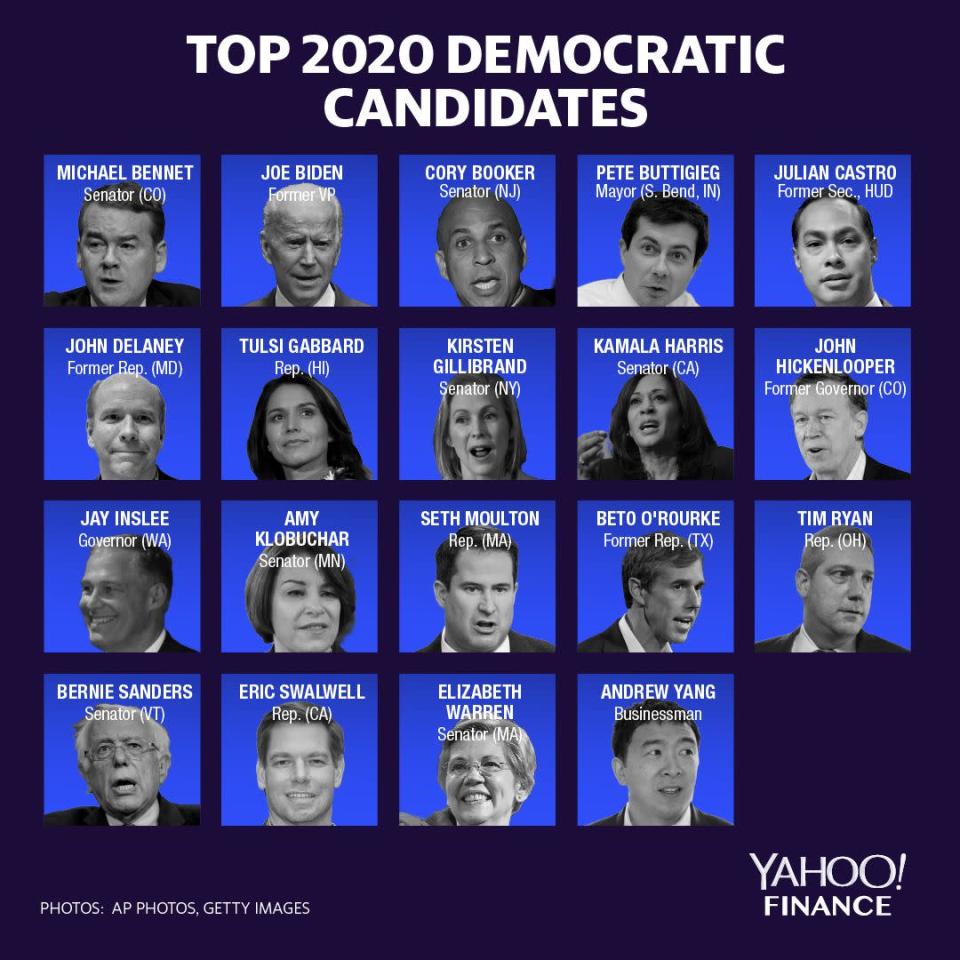So who are women, minorities supporting in 2020?
The Democratic field has become increasingly crowded: over 20 candidates have now officially announced, with several more considered to be mulling bids. But despite the dizzying number of politicians vying to become the party’s nominee, it hasn’t slowed voters from donating in record sums as the 2020 election cycle begins.
Though the election is still 18 months away, many are closely watching small-donor donors and who they are giving their money to – particularly who women and minorities are supporting. In the first quarter, donors gave $175 million to Democratic candidates. It represented a surge of small-dollar donors who largely gave in sums of roughly $32.
According to analysis done by the Center for Responsive Politics, the five female Democrats vying for the party’s nomination pulled in more from women donors than the 11 men analyzed in the first quarter. Candidates Kamala Harris, Elizabeth Warren, Kirsten Gillibrand, Tulsi Gabbard and Amy Klobuchar raised $7.4 million in donations from women. In comparison, the men were able to raise a combined $7.35 million from female donors.
The report only analyzes donations over $200 — with so many candidates relying on grassroots fundraising of small sums, it’s likely these total donations from female donors would be higher.
According to data from the Democratic fundraising platform ActBlue, 60% of Democratic donors during the 2018 midterm elections identified as women. And across the country, women were the majority of donors in every state. Enagement as been on the rise among women; in 2018, each state saw between roughly a 4% and 10% increase of all donors identifying as women.

The 2020 elections are shaping up to be more expensive and with more donor engagement than ever before. “The strong fundraising totals that we saw across the board this quarter indicates that small-dollar donors are more energized than ever before, and there's no sign that the rate at which they are giving to Democrats is slowing down anytime soon,” said Erin Hill, executive director of ActBlue.
And with so many female candidates to choose from, women are making sure to throw their money behind them. With $3.6 million raised from female donors alone, Sen. Kamala Harris is far and away the most popular candidate with women. Beto O’Rourke is the next favorite among women, pulling in $1.6 million during the first quarter. But not all of the most favored candidates are Democrats. Using the same analysis of itemized contributions, President Trump also pulled in a lot of money from women — to the tune of $1.4 million.
Donors of color
Women aren’t the only engaged donors. So are people of color.
“I think we will see record-breaking engagement of donors online from what we saw in 2018,” said Quentin James, founder and executive director of the Collective PAC, which seeks to “fix the challenge of African-American underrepresentation in elected seats of power.” During the 2018 midterm elections, Collective PAC saw over 20,000 donors of color give more than 47,000 contributions to work they supported and candidates that Collective PAC endorsed.
James said that with so many candidates vying for donors, the time is ripe for donors of color to “flex their muscles.”
And when it comes to individual candidates, Harris is the “common denominator” among women and minorities, James said. Bernie Sanders has a “built in audience” of grassroots donors, though he isn’t sure how many people of color will be supporting him. Massachusetts Senator Elizabeth Warren has also generated a “lot of interest” from black women, but James said that hasn’t translated to financial contributions.
“I think Joe Biden is very exciting to donors of color,” he added. “He did get a boost when he announced from donors of color — but I’m not sure if that’s going to be sustained. For online giving, the excitement is around Kamala Harris.”
Harris isn’t the only minority candidate vying for the Democratic party’s nomination. But James says donors simply aren’t as excited about minority male candidates.
“Julian Castro and Cory Booker are at the margins — they aren’t driving the conversation like we are seeing with Senator Harris,” he said.
And between black men and women, women, like their white counterparts, are far more engaged than the men.
Changing the narrative
Political donations have often been viewed as coming primarily from white, wealthy, conservative voters.
“People of color are extremely important when it comes to the vote, but we haven’t been seen as very important when it comes to fundraising,” James said. “Sixty-three percent of people in public office are white men and that’s a reflection of who is giving to politics.”
According to research from Demos, women of color make up 13% of the adult population, but only 9% of donors, and 6% of all the money contributed. White men make up 35% of the adult population — but 57% of money contributed to campaigns come from white men, the research found.
But with the advent and popularity of small-dollar donations, there is an opportunity to change the political narrative. For the first time, the Democratic party has set grassroots fundraising targets (donations from at least 65,000 people) in order to participate in the early debates.
“Small-dollar donors have the potential to help spur a new generation of people of color in political leadership,” James said. “The opportunity to have a person of color on the Democratic ticket will unleash a new generation of online and grassroots donors to the party. While you don’t want to lean solely on identity politics, there is power in representation.”
Kristin Myers is a reporter at Yahoo Finance. Follow her on Twitter.
Read more:
America’s 3 wealthiest families have more money than 4 million average families combined
Study: Parents skimp on retirement to support adult children
Follow Yahoo Finance on Twitter, Facebook, Instagram, Flipboard, LinkedIn, YouTube, and reddit.

